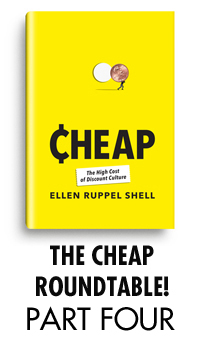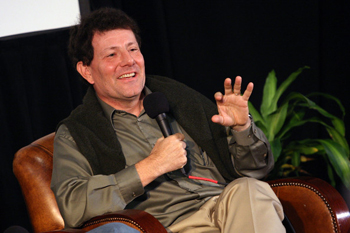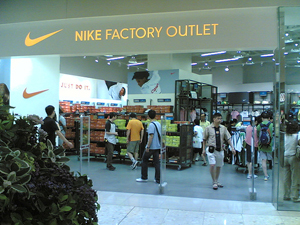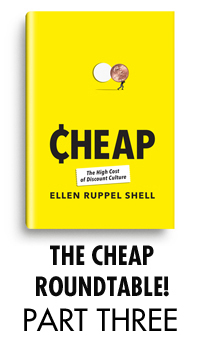 (This is the fourth of a five-part roundtable discussion of Ellen Ruppel Shell’s Cheap: The High Cost of Discount Culture. Other installments: Part One, Part Two, Part Three, and Part Five.)
(This is the fourth of a five-part roundtable discussion of Ellen Ruppel Shell’s Cheap: The High Cost of Discount Culture. Other installments: Part One, Part Two, Part Three, and Part Five.)
Edward Champion writes:
I’m going to attempt to address as many of these interesting points as I can, even as we await Levi’s answer with book before him and take up Miracle Jones’s sensible advice on how to live cheap.
Early into the discussion, Peggy mentioned that she thought Ruppel Shell hadn’t entirely considered the idea of community-based commerce. I’d like to go further and suggest that the fault doesn’t entirely lie with Ruppel Shell, but with Nicholas Kristof’s blunt sentiment (quoted in the book) that “anyone who cares about fighting poverty should campaign in favor of sweatshops.” For anyone who’s curious, and to partially answer Whet’s question, Kristof’s entire piece can be read here.
 In her endnote, Ruppel Shell points out that Kristof’s been pro-sweatshops since the late 1990s, co-authoring articles titled “Two Cheers for Sweatshops: They’re dirty and dangerous. They’re also a major reason Asia is back on track.” (Rather interesting, this attention-seeking and extremely callous subhead appears to have been expunged from the New York Times’s archive. But it’s also worth observing that Ruppel Shell is careful to call Kristof “a generally insightful and sensitive reporter.”)
In her endnote, Ruppel Shell points out that Kristof’s been pro-sweatshops since the late 1990s, co-authoring articles titled “Two Cheers for Sweatshops: They’re dirty and dangerous. They’re also a major reason Asia is back on track.” (Rather interesting, this attention-seeking and extremely callous subhead appears to have been expunged from the New York Times’s archive. But it’s also worth observing that Ruppel Shell is careful to call Kristof “a generally insightful and sensitive reporter.”)
The workers who toil for long and dangerous hours in such hidden economies are very much on my mind, for I am presently doing my best to work my way through William T. Vollmann’s massive Imperial. It isn’t just a matter of time always being reframed as a monetary value. It’s the way in which we defend our lifestyles, whether it’s assuming that a book attempting to plunge deeper into an important issue is “telling us what we already know.” And it’s evident in the way Kristof writes such pat summations as:
This is not to praise sweatshops. Some managers are brutal in the way they house workers in firetraps, expose children to dangerous chemicals, deny bathroom breaks, demand sexual favors, force people to work double shifts or dismiss anyone who tries to organize a union. Agitation for improved safety conditions can be helpful, just as it was in 19th-century Europe. But Asian workers would be aghast at the idea of American consumers boycotting certain toys or clothing in protest. The simplest way to help the poorest Asians would be to buy more from sweatshops, not less.
Our enviable lifestyles would appear to trump any and all inquiry into those who toil to sustain it. We think that, if we mention a sweatshop, we can purport to comprehend what it is like to toil and suffer in that sweatshop. But how are we any better than Kristof in our assumptions? To what degree does contributing to the labyrinthine network of cheap cut-rate goods produced in exploitative situations actually help the Third World? Should we be concerned with our Faustian bargain? And did Ruppel Shell, as Peggy has suggested, not adequately represent these many labor categories by degree? No, the Walmart worker can’t afford to shop at Whole Foods. But then the sweatshop worker can’t afford to shop at Walmart. Does consumer confidence help the worker who is below us? Or is this all part of the same Shell game?
Which brings us to the issue of necessity, both real and fabricated, initially raised by Colleen and expanded upon by several others. Like Miracle Jones, I too admire Ruppel Shell’s personal honesty. And I think that understanding and vocalizing the ways in which we spend money are just as important in understanding the bigger economic picture. If such an approach amounts to “telling us what we already know,” then I would say this: If I asked each of you to publicly report the annual income that you entered into your 1040, then chances are you wouldn’t do it. That would be an invasion of your privacy. If I asked each of you to tell me precisely how you spent your money over the last week, complete with an itemization of costs and expenses for each day, chances are that you probably haven’t kept track. And yet, thanks to those dependable Gruen transfers, we’re happy to cling to a remarkably shifting sense of the deep discount deals we’re getting. To the point where Amazon consumers have been tagging eBooks with $9.99 tags because that’s the price they now want to pay. Never mind that, as Publishers Weekly reported back in May, Amazon actually loses money at that price point. Does Amazon get a fair pass, as Miracle Jones suggests? Yes and no, I think. One could make a similar case for Starbucks. On one hand, I wish that Ruppel Shell had delved into Amazon’s parasitic stranglehold on the industry. But at the possible risk of comparative oversimplification, I think it could be argued that IKEA’s ubiquity falls into more or less the same rub. As documented by Ruppel Shell, like Amazon, IKEA spends a tremendous amount of time framing the message, whether in the form of a twee Spike Jonze commercial or a slick and colorful catalog. More questions to the group: Should we look at discount culture on a case-by-case basis? Or is this all monolithic? (Yes, Amazon is online and caters to convenience. IKEA, on the other hand, is a big box store. Should it matter whether we physically or virtually participate in these Gruen transfers? The labor is still unseen, whether it’s Amazon workers being exploited, as the London Times reported back in December, or IKEA’s illegal cutting.)
 To address Erin’s track suit dilemma, after thinking about this a bit, I’m inclined to agree — particularly in light of Our Man in Boston’s provocative remarks about elites and elitism. But I’m wondering if Ruppel Shell’s stereotypical descriptions are somewhat defensible, because outlet stores, discount stores, and shopping malls are, by way of their respective designs, spaces that prey upon our cognitive abilities to process numerous aesthetics. I don’t want to let Ruppel Shell off the hook on this point — and certainly Janet Maslin didn’t by suggesting that Ruppel Shell needed to “bring a professor of marketing to a Nevada outlet mall to tell her that bargains are phony,” although I think this anti-intellectual assessment isn’t entirely fair to what Ruppel Shell dug up. Much as casinos are specifically designed to keep us gambling (no clocks, no windows, lots of lights, free drinks), I’m wondering if outlet stores might be working in a similar way. Consider this 1998 article from Retail Traffic, which outlines very specific design decisions to convince the customer that she’s getting a good deal. It’s quite possible that this may be just as vital, if not more so, as brand name manipulation. And so I ask some of the pessimists in the peanut gallery this: If the book “tells us what we already know,” then just how aware are you of a store’s aesthetics when you go shopping? Bargain hunting may very well be a harmless American pastime for some, but if we’re more concerned with price and acquisition (instead of say the human souls who work at the store or the way the store is designed), then it would seem to suggest that we don’t know as much as we think.
To address Erin’s track suit dilemma, after thinking about this a bit, I’m inclined to agree — particularly in light of Our Man in Boston’s provocative remarks about elites and elitism. But I’m wondering if Ruppel Shell’s stereotypical descriptions are somewhat defensible, because outlet stores, discount stores, and shopping malls are, by way of their respective designs, spaces that prey upon our cognitive abilities to process numerous aesthetics. I don’t want to let Ruppel Shell off the hook on this point — and certainly Janet Maslin didn’t by suggesting that Ruppel Shell needed to “bring a professor of marketing to a Nevada outlet mall to tell her that bargains are phony,” although I think this anti-intellectual assessment isn’t entirely fair to what Ruppel Shell dug up. Much as casinos are specifically designed to keep us gambling (no clocks, no windows, lots of lights, free drinks), I’m wondering if outlet stores might be working in a similar way. Consider this 1998 article from Retail Traffic, which outlines very specific design decisions to convince the customer that she’s getting a good deal. It’s quite possible that this may be just as vital, if not more so, as brand name manipulation. And so I ask some of the pessimists in the peanut gallery this: If the book “tells us what we already know,” then just how aware are you of a store’s aesthetics when you go shopping? Bargain hunting may very well be a harmless American pastime for some, but if we’re more concerned with price and acquisition (instead of say the human souls who work at the store or the way the store is designed), then it would seem to suggest that we don’t know as much as we think.
Good Christ, I’ve been a wordy bastard. And I’ve only just begun to address all the interesting thoughts on the table. So I think I’ll stop for now, see what others have to say about all this, and return later, possibly after Levi has offered his informed answer to Colleen’s question (which I certainly look forward to hearing!).
Colleen Mondor writes:
I did want to point out one thing about bargain hunting. A lot of people bargain hunt at garage sales and thrift stores (I have seen some amazing things scored this way), which is another deal altogether and not at all related to bargain hunting at IKEA or Walmart. There can, in fact, be different types of bargain hunters and I don’t think they should all be grouped together in one large mass.
There’s one other interesting idea to think about as we consider poor in this country: how you live poor depends on where you live. Miracle’s rules would certainly not work in Alaska where poor folks eat King Crab and catch wild salmon, shrimp etc. — food that would be considered beyond the reach of the poor and/or middle class in the Lower 48.
And many middle class and rich folks love their pit bulls too. I’m just saying.
Robert Birnbaum writes:
Books like Cheap, et al raise the question that subsumes the pretext for the traditional liberal education (i.e., “knowledge is power”). By the way, David Foster Wallace’s Kenyon College 2005 oration is worth looking at on this point.
The relentless (some might use the banal modifier “24/7”) chimes of commerce create such a shitstream of noise that whatever we think we know is disabled in the face of the symphonic chord (think Mahler’s 10th): BUY THIS, BUY NOW.
Some of you all sound like you think you are immune. Good for you. I’m not. Not that I am siting on a pile of junk. But I am sitting on a pile. Did I mention the hoodies, the socks, and the caps?
The only antidote I have found effective is exhibited here:
Also, for those of you unaware of John Crowley, his new opus Four Freedoms should, if there is a modicum of reward for good works in this disinterested universe, gain him a proper audience.
Erin O’Brien writes:
(1) “Sex, conversation, art, and games are what actually make people happy.”
“Become cheap. Don’t fight it. Go so deep into cheap that you become competition for these eeeeeevil discounters. Become so cheap that you are affordable to everybody in all your favorite activities (sex, conversation, games, art), both rich and poor alike. You will have a good life.”
Miracle, I see that you are a genius like me. Remind me to send you my zucchini soup recipe. And as a side note: DO NOT purchase inexpensive marital aids. Just trust me on this one. Contact me off-list for more specific information.
A related Erinism: Buy your plates for $0.50 a piece at a garage sale. You’ll never have a matching set, but, once in a while, you may be able to afford to plop lobsters on them.
 (2) Ed, regarding casinos, the poker chips are a trick as well. Your money has been subtly taken from you from the get go and you’re left with piles of inane plastic disks that go up and down with each spin of the wheel. To me, credit cards are a not-too-distant relative: a thin piece of plastic that magically gets you stuff, stuff stuff!
(2) Ed, regarding casinos, the poker chips are a trick as well. Your money has been subtly taken from you from the get go and you’re left with piles of inane plastic disks that go up and down with each spin of the wheel. To me, credit cards are a not-too-distant relative: a thin piece of plastic that magically gets you stuff, stuff stuff!
(3) Her Amazon comments aside, Ruppell Shell didn’t poke very hard at the implication of the Internet price comparison and the way it’s changed price shopping forever.
(4) On bookshelves:
So I’m on one of my endless walks and I pass some guy’s garbage pile. There’s two bookshelves in it.
“Shit,” I say, because they’re pretty good books shelves.
I keep walking, hoping that the bookshelves will be there after I’ve walked the 2.5 miles back home and returned with my Mini Cooper in order to heist the cast-off loot. As luck would have it, a buddy of mine is drives by and pulls up next to me to say hello. He’s in his pickup.
So, yeah, I have cheap bookshelves.
IKEA? I’ve never been to IKEA. Why would I drive all the way to Pittsburgh to go to someplace called IKEA?
Levi Asher writes:
I’ve now carefully reread the IKEA chapter, and I’m ready to respond to Colleen’s question from last week.
First, I think Janet Maslin scooped my answer when she wrote this in her mostly negative review of Cheap:
At the end of a chapter largely devoted to the horrors of Asian shrimp farming, she describes being in a Red Lobster restaurant with friends and being enlightened enough to eschew cheap shrimp in favor of chicken. Yet cheap chicken-farming isn’t any less ghastly. It just doesn’t happen to be addressed by this book.
I consider myself a very socially aware person. And I definitely think it’s important for me to make personal choices that are not harmful to others, or to the planet’s ecosystems. Of course, this is easier said than done. We each have our own ways of dealing with this uncomfortable truth. My own brand of social awareness places heavy emphasis on issues of global politics, war, and genocide. These are probably my own “pet topics,” and I think it’s interesting that the last time Colleen and I disagreed about a book, we were discussing Nicholson Baker’s Human Smoke. I felt Baker’s book presented a very powerful argument that the Roosevelt-Churchill strategy in World War II led to far greater death, destruction, and genocide than was required to defeat Hitler, while Colleen (I hope that I am remembering correctly) did not feel the book presented a solid argument.
I also vividly remember one of the biggest disagreements I’ve ever had with Ed Champion. I thought Naomi Klein’s The Shock Doctrine presented a solid and important argument about the insidious underlying purpose of the American misadventure in Iraq, whereas Ed had nothing but criticism for Klein’s work. So it’s funny that now Ed and Colleen seem to be bowled over by the arguments in Ellen Ruppel Shell’s Cheap, while I stand here saying, “What?”.
 I don’t think Cheap is a bad book, and I like Ruppel Shell’s basic mission in making us aware of the choices we make when we shop. But her case against IKEA, like many of the cases presented here, feels underdeveloped. She writes of declining forests and environmental sustainability problems, but this is a problem for all woodworking industries. She ends the chapter by swooning over a heavy (non-IKEA) oak bookshelf, but this bookshelf was also made by cutting down a tree. And even though it will last longer, Ruppel Shell knows there are not enough antique bookshelves around to furnish the world. Sure, if IKEA is committing environmental offenses, then these ought to be addressed and stopped. But Ruppel Shell only hints (and never establishes) that these offenses take place more at IKEA than at any smaller furniture provider. She also shows us that IKEA does try to be environmentally conscious, that they “use every part of the tree”, monitor their suppliers, etc. I see innuendo weaved into these sentences. But I find no clear case, no smoking gun. And Cheap is not a book about the environment or about the problems of an overpopulated world. So the environmental points especially come off as half-baked and incomplete to me.
I don’t think Cheap is a bad book, and I like Ruppel Shell’s basic mission in making us aware of the choices we make when we shop. But her case against IKEA, like many of the cases presented here, feels underdeveloped. She writes of declining forests and environmental sustainability problems, but this is a problem for all woodworking industries. She ends the chapter by swooning over a heavy (non-IKEA) oak bookshelf, but this bookshelf was also made by cutting down a tree. And even though it will last longer, Ruppel Shell knows there are not enough antique bookshelves around to furnish the world. Sure, if IKEA is committing environmental offenses, then these ought to be addressed and stopped. But Ruppel Shell only hints (and never establishes) that these offenses take place more at IKEA than at any smaller furniture provider. She also shows us that IKEA does try to be environmentally conscious, that they “use every part of the tree”, monitor their suppliers, etc. I see innuendo weaved into these sentences. But I find no clear case, no smoking gun. And Cheap is not a book about the environment or about the problems of an overpopulated world. So the environmental points especially come off as half-baked and incomplete to me.
What I was trying to point out in my earlier post here is that IKEA has an appeal beyond dumb cheapness. It is a positive lifestyle choice for people like me — mobile adults who like to travel light. If IKEA has problems — environmental problems, labor problems, quality problems — than these problems should be addressed and solved. But nothing I read here seems to add up to a call for a wholesale rejection of everything IKEA represents. I could take Robert Birnbaum’s suggestion and build bookshelves out of spare planks and bricks — but, Robert, have you ever seen photographs from the Chinese and South Indian infernos where bricks are produced? It’s not a pretty picture.
Finally, I have to complain about some shoddy work on Ruppel Shell’s part in this IKEA chapter. On pages 126 and 127 she goes on at some length about the Spike Jonze commercial that reminds consumers that furniture has no feelings, and then points to the irony that IKEA tries to create an emotional attraction to furniture by giving its pieces pet names. Then, on page 140, she repeats the exact same point, as if we’d never heard it before. “Doesn’t a name connote intimacy? Of course it does, and IKEA knows well the power of intimacy to move us.” It’s hardly such a powerful point that she needs to fully develop it twice in two separate parts of the book.
Often, when I read Cheap I felt as if I was being filibustered. Going on about the trivial issue of IKEA giving cute names to its objects, Ruppel Shell specifically mocks the store for “naming a wok after a girl”. But, reading the notes for the chapter, I discover that the wok in question is called “Pyra”. Clearly, this wok is named after the Greek term for fire, as every consumer who sees a wok named “Pyra” will understand. Ruppel Shell couldn’t find a better example than this? I don’t understand why she didn’t at least pick a better example (say, a bookshelf named “Billy”). It’s ironic that a polemic against “cheap” should have such problems with quality control.
I also feel personally put off after reading and rereading Ruppel Shell’s lush paean to the sturdy oak bookshelf “groaning with books” that her friend bought after rejecting the IKEA lifestyle. My cheap bookshelves “groan with books” too. Ruppel Shell’s poor friend will spend the rest of her life lugging that heavy piece of furniture around. This book absolutely fails to inspire me to want to follow her example.
Nina MacLaughin writes:
In response to Robert’s point about immunity to the chimes of commerce. It’s impossible to be immune; even if you’re a conscious shopper, sensitive, responsible, the siren song (or “shitstream of noise”) penetrates.
 A quick example (and I’m on the side of folks who appreciated Ruppel Shell’s personal anecdotes): There was a Whole Foods located less than a 10 minute walk from my house in Cambridge, Massachusetts. I passed by the store on my walk home from work. It was where I bought my food. I knew it was more expensive, but it was a matter of convenience. Time and money. It was worth it to me to spend the extra bucks to save myself some out-of-the-way trip to a cheaper spot. About three months ago, I moved to Somerville, and the closest supermarket is an expansive, always-crowded Market Basket. It’s got all the same brands as Whole Foods. My first time inside the store, buying the same combo of foods, and more or less the same brands that I would at Whole Foods, I was staggered at how much less it cost. What would’ve been $18 at Whole Foods was a little over $7 at Market Basket. Unbelievable. There is definitely a delight in that. And yet, somewhere in the back of my head, there’s been a gnawing sense that the veggies are saturated with pesticides, that the yogurt is rife with hormones, and that it’s cheaper at Market Basket because the food is poisoned (obviously a little overstated, but you get the idea). And I’ve been sort of wowed about this, in the sense that, holy shit, Whole Foods has done a pretty powerful job marketing themselves. It also speaks to the the complications of price and worth and quality and value that Ruppel Snell explores. Would I rather pay $3.49 for a pint of cherry tomatoes at Whole Foods? Or $2.10 for the same pint at Market Basket? I’d rather pay less, but it does put a doubt — a completely irrational doubt — in my head. Am I getting something that isn’t as good (or, in the case of food, something that isn’t as safe)? Is this doubt borne from the power of Whole Foods’ marketing (and my action buying into it) or the mysteries of price and quality? Or a combo that is hard to know? Whatever it is, it’s certainly interesting to consider.
A quick example (and I’m on the side of folks who appreciated Ruppel Shell’s personal anecdotes): There was a Whole Foods located less than a 10 minute walk from my house in Cambridge, Massachusetts. I passed by the store on my walk home from work. It was where I bought my food. I knew it was more expensive, but it was a matter of convenience. Time and money. It was worth it to me to spend the extra bucks to save myself some out-of-the-way trip to a cheaper spot. About three months ago, I moved to Somerville, and the closest supermarket is an expansive, always-crowded Market Basket. It’s got all the same brands as Whole Foods. My first time inside the store, buying the same combo of foods, and more or less the same brands that I would at Whole Foods, I was staggered at how much less it cost. What would’ve been $18 at Whole Foods was a little over $7 at Market Basket. Unbelievable. There is definitely a delight in that. And yet, somewhere in the back of my head, there’s been a gnawing sense that the veggies are saturated with pesticides, that the yogurt is rife with hormones, and that it’s cheaper at Market Basket because the food is poisoned (obviously a little overstated, but you get the idea). And I’ve been sort of wowed about this, in the sense that, holy shit, Whole Foods has done a pretty powerful job marketing themselves. It also speaks to the the complications of price and worth and quality and value that Ruppel Snell explores. Would I rather pay $3.49 for a pint of cherry tomatoes at Whole Foods? Or $2.10 for the same pint at Market Basket? I’d rather pay less, but it does put a doubt — a completely irrational doubt — in my head. Am I getting something that isn’t as good (or, in the case of food, something that isn’t as safe)? Is this doubt borne from the power of Whole Foods’ marketing (and my action buying into it) or the mysteries of price and quality? Or a combo that is hard to know? Whatever it is, it’s certainly interesting to consider.
Edward Champion writes:
To respond quickly to Levi:
(1) Maslin actually got that detail wrong. She was never in a Red Lobster restaurant with friends. I’m surprised that not a single fact checker at the supposed Paper of Record got off his ass to grab the book, flip to the “Red Lobster” entry in the index, and confirm that Maslin was indeed quite wrong. (Damn those bloggers sitting in basements in Terre Haute!)
(2) My problems with Naomi Klein’s The Shock Doctrine had more to do with her assumptive approach to the subject — specifically, tying nearly every one of her investigations to the “shock doctrine” brand name after the fact. As Richard Flanagan suggested in his novel, The Unknown Terrorist, journalism is not a sudoku puzzle. It was not unlike Gladwell’s “tipping point” or Anderson’s “long tail.” Ruppel Shell’s book, on the other hand, demonstrates substantive journalism, as can be gleaned from the solid and often detailed endnotes. (I mentioned, for example, the fairness she gave to Kristof.) I do have problems, as others have pointed out, with some of Ruppel Shell’s quasi-elitist descriptions. But if we look to the facts, the findings, the quotes, and the data, I believe that there’s much here in this book to consider, whether you think you know where you stand or not. And as Birnbaum said a few messages back, some of you think you are immune. (I’m sure as hell not.)
 (3) The many problems with IKEA, and it is all thoroughly documented in the “Death of a Craftsman” chapter (and I would suggest consulting the endnotes), is that it represents one of greatest manifestations of discount culture. IKEA’s founder is Ingvar Kamprad. He is the seventh richest man in the world, but he still haggles with vegetable vendors and he still flies coach. IKEA has single-handedly altered Western ideas of interior design, perhaps to the same degree of Postrelian plaudits rightly derided by Jackson. Let me tell you a story. When I moved from San Francisco to Brooklyn, I had to leave behind all of my bookcases. These bookcases were hand-built by a team of craftsmen in the Castro. A place I highly recommend, if you’re ever in the market for bookcases in San Francisco, called Books and Bookshelves. The guy would custom-design them for you. And these shelves were built like houses. They wouldn’t wobble or fall apart like the IKEA bookcases. I was able to store a considerable amount of books, while ensuring that I had some wall space in my apartment that wasn’tt occupied by books. When I moved cross-country, I was forced to get rid of these shelves. I initially put up a Craig’s List ad for $50 a pop, which was a little less than one-third of the price that I paid for them. Very few people wanted them. And some people emailed me thinking they were IKEA bookcases. They literally hadn’t experienced bookcases built out of real durable wood. When I couldn’t get any buyers for the last few, I gave them away on the street. And again, people came up to me — in a seemingly civilized city like San Francisco, no less — asking where I had obtained these bookcases. They pounded the sturdy wooden sides. And I told people that they could store their DVDs in there if they wanted to.
(3) The many problems with IKEA, and it is all thoroughly documented in the “Death of a Craftsman” chapter (and I would suggest consulting the endnotes), is that it represents one of greatest manifestations of discount culture. IKEA’s founder is Ingvar Kamprad. He is the seventh richest man in the world, but he still haggles with vegetable vendors and he still flies coach. IKEA has single-handedly altered Western ideas of interior design, perhaps to the same degree of Postrelian plaudits rightly derided by Jackson. Let me tell you a story. When I moved from San Francisco to Brooklyn, I had to leave behind all of my bookcases. These bookcases were hand-built by a team of craftsmen in the Castro. A place I highly recommend, if you’re ever in the market for bookcases in San Francisco, called Books and Bookshelves. The guy would custom-design them for you. And these shelves were built like houses. They wouldn’t wobble or fall apart like the IKEA bookcases. I was able to store a considerable amount of books, while ensuring that I had some wall space in my apartment that wasn’tt occupied by books. When I moved cross-country, I was forced to get rid of these shelves. I initially put up a Craig’s List ad for $50 a pop, which was a little less than one-third of the price that I paid for them. Very few people wanted them. And some people emailed me thinking they were IKEA bookcases. They literally hadn’t experienced bookcases built out of real durable wood. When I couldn’t get any buyers for the last few, I gave them away on the street. And again, people came up to me — in a seemingly civilized city like San Francisco, no less — asking where I had obtained these bookcases. They pounded the sturdy wooden sides. And I told people that they could store their DVDs in there if they wanted to.
The upshot is this. These people were mystified by real oak bookcases. Yes, the bookcase was made by cutting down a tree. But the difference is this. These bookcases last decades. An IKEA bookcase, by contrast, falls apart within a few years (at best) and the amount of wood is wasted. Furthermore, the discount culture keeps IKEA running around the world and engaging in illegal and decidedly non-eco friendly cutting practices. You tell me how that’s a positive lifestyle. Would you rather spend $200 on a sturdy bookcase that will hold thick Vollmann books and last a lifetime? Or $90 on a Billy bookcase that will fall apart because its not made to hold anything other than thin mass-market paperbacks (at best)? If your main complaint, Levi, is that Ruppel Shell’s poor friend is going to be lugging around a heavy piece of furniture every couple of years, well, that’s a specious position to take, given all the interim years of sturdy quality. But if you’re happy with your paper-thin particle boards, Levi, by all means, sing a song to IKEA. At the end of the day, we’re all singing hymns to the corporate empire.
Robert Birnbaum writes:
A quick question: Are the IKEA shelves actually made of wood or particle board?
By the way, in between Eddie’s elitist custom book shelves (suitable also for CDs) and the IKEA items, are the inexpensive unfinished pine shelves that I’m sure are available in every city in the mainland USA. You can even paint them colorfully so as to distinguish your self as artsy. Or is it craftsy?
Erin O’Brien writes:
“But her case against IKEA, like many of the cases presented here, feels underdeveloped.”
And when you consider that some event references in Cheap happened just a few months ago, it’s obvious that book was turned around at lighting speed. I couldn’t quite put my finger on it as I read it, but Cheap felt dense and rushed at the same time, perhaps because Ruppel Shell is very smart and Penguin wanted her to write very fast. I suspect Penguin didn’t want to wait around too long only to see the recession cool its heels, along with the sales of this book.
Peggy Nelson writes:
I will have to strongly disagree with the voices who argue that books like this are hypocritical luxury items, preaching to the converted readers who have enough disposable income that they can indulge themselves in a little passive system-bashing before bed. I disagree. The work of demystification is lengthy, heterogeneous, and necessary. And it has taken, and will take, many books, many websites, and a significant amount of talking so that we can see clearly what we are dealing with. This work does not take the place of social/economic activism, but doesn’t delay it or prevent it. Demystification runs parallel to activism, and is just as necessary. Empowering people without a clear analysis of exactly where they are in the system only paves the way for greater misery, and perhaps does more harm than good as people become discouraged, decides that the culprit is greater awareness itself.
I have been trying to stay abreast of the economy and our respective places in it, ever since I was a labor activist in the late ’80s. But there are still things I do not know — for example, the historical trajectory of retail commerce, its philosophy, and its pervasiveness — that I learn from books like this one. Cheap doesn’t go as far as some other books, either in reportage (like Ehrenreich’s Nickel and Dimed) or in systemic analysis (like Rushkoff’s Life, Inc.), but it does occupy its role well. My only qualm was the book jacket. That fast-food yellow is repellent. I know it’s about cheap, but does having it look cheap further its aims?
In terms of Kristof’s pro-sweatshop arguments, we heard a lot of those arguments in my union days too. “Well, they’re better off than they were.” Or words to that effect. This was not made to justify a $12 hoodie purchase, but as part of a global labor discussion. Should we be reaching across national borders to organize? (Yes.) And did we? (No.) (I was with the UAW organizing clericals during that time.)
 I think that this is a difficult argument to combat within the framework of a growth economy. Companies need to get bigger. Companies need not only profit, but profit that’s greater than the last quarter, and a profit rate that’s continually increasing. Buy more, spend more, acquire more, consolidate more, grow more, more, more. This philosophy of “More” (maybe that’s the next catchy title in this series!) does not align itself well, if at all, with other values — like preserving and maintaining limited resources on the planet — and accommodating, perhaps even promoting, other types of values, such as community, creativity, being loved, and playfulness (with kids or just generally).
I think that this is a difficult argument to combat within the framework of a growth economy. Companies need to get bigger. Companies need not only profit, but profit that’s greater than the last quarter, and a profit rate that’s continually increasing. Buy more, spend more, acquire more, consolidate more, grow more, more, more. This philosophy of “More” (maybe that’s the next catchy title in this series!) does not align itself well, if at all, with other values — like preserving and maintaining limited resources on the planet — and accommodating, perhaps even promoting, other types of values, such as community, creativity, being loved, and playfulness (with kids or just generally).
I credit the environmental movement with giving this analysis greater scope by demystifying systems on Planet Earth, including global and regional and micro, and showing not only the interconnectedness of natural systems, but the interconnectedness of natural, economic and cultural systems. Without a general framework of sustainability (instead of “More”), I think the way out is not possible. But within sustainability, I think discussions like this can be actively fruitful. Levi, you are right in pointing out that, despite following the IKEA supply chain back to China and Romania, Ruppel Shell does not fully explore or incorporate the environmental angle here, and that she needs to. I think that’s part of her not addressing the larger overarching points, as I’ve mentioned before. Even smaller, more spotlight-style books like Cheap need to set themselves up correctly in relation to the larger themes, indicating where they fall within a larger spectrum of analysis and action.
(Re: my personal experiences with IKEA. I too move around a lot and don’t want some giant antique monster as a bookshelf. But I also dont’ want to support clear-cutting even in places I can’t see. I’m going to have to do some investigating of my own when it comes time to get my stuff out of storage again.)
Levi Asher writes:
Ed, you’re correct that Janet Maslin slipped up in describing Ruppel Shell in a Red Lobster when she decided to solve the problems of the world by ordering chicken instead of shrimp. It was a seafood restaurant, not a Red Lobster. BUT … the spirit of Janet Maslin’s point remains completely valid. The only reason Rupell Shell was able to feel comfortable ordering chicken instead of shrimp is because she had been studying the problems with shrimp instead of studying the problems with chicken.
And, Ed, that’s nice that you like heavy furniture so much. I also know that you like heavy hardcover books, and that you don’t mind lugging around heavy video equipment book conferences. Milan Kundera wrote eloquently of the choices we make between “heavy” and “light” lifestyles. I am decidedly a “light” person, and I will indeed continue to sing songs of love to IKEA. We haven’t even talked about the great Swedish meatballs and lingonberry jam yet.
Jackson West writes:
Well, apologies for my strident tone. Ed has a way of managing to time these roundtables to my mood and frame of mind rather ruthlessly. Last time, with the Human Smoke roundtable, I was literally in the process of losing my last family link to the era described in the book with the death of my grandmother. This time, I’m essentially living with my parents off in the hinterlands after finally drowning under the cost of living in San Francisco and figuring I needed to get out of the pool long enough to let some invoiced checks arrive for a breath of fresh financial air. (Good news. It seems I’ll be selling microwaves for General Electric soon, if a tad indirectly. But I digress.)
I think what I was trying to get across is that in a book like this, which attempts to elucidate a history to explain contemporary reality, a teleology is implied. In this case, the implied argument is this: In a society where everything is easily commodified and competition becomes one of quantity over quality, invariably there will be a race to the bottom in terms of both pricing and marginal profits. Environmental and social degradation hijinks ensue.
This is, in Ruppel Shell’s estimation (and many of our estimations), a bad thing. Of course, there was a guy way back in the industrial revolution, a student of capitalism if you will, who also noted the trend. What was his name again? Something German. Got a lot of people worked up. Led to some bloodshed (though, of course, not nearly as efficiently as that wrought by capitalism). Now he’s pretty much persona non grata in the wake of a bunch of nationalist revolutions that ended in autocracy, but cloaked their intent in his ideology.
Hence, like the Kristof example above, there are those who would defend the depredations of a sweatshop because they believe, “Hey, at least it ain’t feudalism!” (And of course, they’re not the ones sweating.) This is a sentiment which, oddly enough, the likes of Lenin, Friedman, Trotsky, and Rand would agree. It’s like the Ku Klux Klan and the Black Panthers getting together on the issue of gun control. Counterintuitive, but true.
The problem is, when an industrial capitalist society bent on growth at all costs essentially runs out of room to grow — as it has now that it is truly global — then what’s next? Well, for starters, it seems that wages stagnate even as productivity grows. Because “sweatshops for all!” really means just that — an equilibrium in which which the working class works for crappy wages to produce cheap shit to sell to the rest of the working class, with the difference accruing to the owners of the means of production.
Progress!
But in America we still have the luxury of sitting on the fat side of the trade balance, meaning our working class can maintain the delusion that they’re actually middle class because just look at this sweet bedroom set I just bought on my credit card even though I’m underemployed and lack health insurance. A delusion that we’re only too happy to perpetuate, to misquote Dick Cheney as Malcolm X, by any means necessary. Again, Ruppel Shell lays this all out (and succinctly so). I’m just paraphrasing.
In all this aspirational class alienation, however, a petit bourgeois strain of thought persists. And I felt that this impulse formed the crux of Ruppel Shell’s concluding arguments. Namely, that if we return to the somewhat sentimental capitalism of our forefathers (and they were all fathers), we can turn back to a Jeffersonian ideal of libertarian utopia. The argument goes something like this: “Capitalism isn’t bad, per se. Just industrial capitalism. And if it weren’t for the state colluding with certain corporations to corrupt the market, we wouldn’t be in this unsustainable clusterfuck that we’ve now found ourselves in.” Also: Sex slaves.
The funny thing is that my homelessness brought me to the family cabin as very much the prodigal son. I’ve actually found myself in what I imagine to be something near the image of postindustrial capitalist utopia that Ruppel Shell and her peers seem to be pining for — a small scale organic paradise with broadband Internet. A sort of info-agrarian mash-up of self reliance, sustainability, and all the free porn you can stand. For those who’d like to stay in the cities, well, you’ll be making the porn (natch) and selling the advertising in order to pay for the delicious goats and tomatoes that rural types bring to market.
Perfection!
To go back one last time to my original entry, the question that’s bedeviling me (and, to Ruppel Shell’s credit, it would probably not be so damn devilish if I hadn’t read her book and instead was rubbing myself sore with the porn and such) is whether there are enough cabins to go around, or whether this enlightened and entrepreneurial information age that our best and brightest are so eagerly striving for will simply be crushed under the weight of peak oil and slums and drought and war and all the sins of the industrial age which we (and I mean we, us here, and presumably Ruppel Shell’s intended audience) love to hate.
But I think trying to answer that is my book to write, in which case I may milk the middle class for my piece of the pie and buy a garden of my own to tend. And maybe a shotgun to keep the hungry hordes off my garden. The freeloading Commie bastards.


 Sadly, like Kathleen, I wasn’t particularly surprised by many of the examples used in Cheap. However, unlike Kathleen, I’m a bit of a bargain hunting hobbyist — mostly in the realm of clothes, food and media. Because, as many of you know, writing isn’t exactly the quickest way to riches these days (if it ever was). Maybe if I wrote something to shake the moral and ethical foundations of your typical NPR-listening, Prius-driving IKEA and Whole Foods shopper I’d have more money lying around to spend on handmade furniture, bespoke suits, grass-fed beef and sustainably grown potatoes.
Sadly, like Kathleen, I wasn’t particularly surprised by many of the examples used in Cheap. However, unlike Kathleen, I’m a bit of a bargain hunting hobbyist — mostly in the realm of clothes, food and media. Because, as many of you know, writing isn’t exactly the quickest way to riches these days (if it ever was). Maybe if I wrote something to shake the moral and ethical foundations of your typical NPR-listening, Prius-driving IKEA and Whole Foods shopper I’d have more money lying around to spend on handmade furniture, bespoke suits, grass-fed beef and sustainably grown potatoes. Postrel argues that the despicably produced furniture from the likes of Target is valuable, because of the aesthetic thought that went into the plastic mold. She goes on to write that a world of disposable plastic luxury in bright colors and pleasing curves is a beautiful and dynamic one; that the clever packaging and marketing that surrounds a fast-food hamburger and the medical technology developed to cure the heart attacks or the diabetes it gives you are both boons. To suggest otherwise makes you hopelessly backward.
Postrel argues that the despicably produced furniture from the likes of Target is valuable, because of the aesthetic thought that went into the plastic mold. She goes on to write that a world of disposable plastic luxury in bright colors and pleasing curves is a beautiful and dynamic one; that the clever packaging and marketing that surrounds a fast-food hamburger and the medical technology developed to cure the heart attacks or the diabetes it gives you are both boons. To suggest otherwise makes you hopelessly backward. But at least revolutions happen at the time and choosing of the revolutionaries. What worries me about the current spate of liberal hand-wringing in books like Cheap is that in not calling for a wholesale rethought of our political and economic organization, in only urging personal responsibility and institutional reform, we’re simply not going to act fast enough to avoid a catastrophic reckoning. Because I have a bad feeling that all the “hidden costs” we’ve been charging to the bank of the future are being added up on some terrible ledger, and we will all have to pay for them eventually.
But at least revolutions happen at the time and choosing of the revolutionaries. What worries me about the current spate of liberal hand-wringing in books like Cheap is that in not calling for a wholesale rethought of our political and economic organization, in only urging personal responsibility and institutional reform, we’re simply not going to act fast enough to avoid a catastrophic reckoning. Because I have a bad feeling that all the “hidden costs” we’ve been charging to the bank of the future are being added up on some terrible ledger, and we will all have to pay for them eventually. As Colleen said, we’re talking about issues now that wouldn’t have registered in the slightest during the advertising boom of the ’60s, the gas guzzling years of the ’70s (crisis notwithstanding), the Me Generation ’80s, and even the ’90s, which sure look like a happy boom period from 2009. Maybe Cheap isn’t Silent Spring or Unsafe at Any Speed or even Fast Food Nation, but so what? For me, it passed many smell tests: There was (a) well-thought out, sourced, journalism of originality, (b) a clear, distinct voice, and (c) at least some attempt at problem-solving. And ultimately, there is absolutely no harm in repeating ideas you “know” about from a different angle or a new slant. Because maybe, just maybe, it will register and resonate and hit home. Need I bring up the adage about how many times we have to see an ad before it registers? Or other market research stats on the branding and corporate mentality propping up the lowest-price-is-best mantra? I know I’ve read any number of articles on any number of subjects and all it takes is one read at one time in one place for something to “click” in place, to get me thinking at a deeper level. Such are the goals of a book like Cheap and, as a result, it succeeded for me.
As Colleen said, we’re talking about issues now that wouldn’t have registered in the slightest during the advertising boom of the ’60s, the gas guzzling years of the ’70s (crisis notwithstanding), the Me Generation ’80s, and even the ’90s, which sure look like a happy boom period from 2009. Maybe Cheap isn’t Silent Spring or Unsafe at Any Speed or even Fast Food Nation, but so what? For me, it passed many smell tests: There was (a) well-thought out, sourced, journalism of originality, (b) a clear, distinct voice, and (c) at least some attempt at problem-solving. And ultimately, there is absolutely no harm in repeating ideas you “know” about from a different angle or a new slant. Because maybe, just maybe, it will register and resonate and hit home. Need I bring up the adage about how many times we have to see an ad before it registers? Or other market research stats on the branding and corporate mentality propping up the lowest-price-is-best mantra? I know I’ve read any number of articles on any number of subjects and all it takes is one read at one time in one place for something to “click” in place, to get me thinking at a deeper level. Such are the goals of a book like Cheap and, as a result, it succeeded for me. 3. Most of the money you make every month will go to rent. This is a necessity. If you are homeless, you will get fired from your “job” or you will get jumped so often that you will become a paranoid wreck. Try to get more roommates, if you can’t hack rent. Learn to live with couples. Don’t listen to bearded weirdos who tell you homelessness is the true freedom. Being homeless feels “free” for exactly three days, and then you start to hate all of humanity, including yourself, which is more stressful than a full-time job.
3. Most of the money you make every month will go to rent. This is a necessity. If you are homeless, you will get fired from your “job” or you will get jumped so often that you will become a paranoid wreck. Try to get more roommates, if you can’t hack rent. Learn to live with couples. Don’t listen to bearded weirdos who tell you homelessness is the true freedom. Being homeless feels “free” for exactly three days, and then you start to hate all of humanity, including yourself, which is more stressful than a full-time job.  7. Get rid of your television. Forever. Watching rich people whine is no kind of entertainment for a normal person such as yourself.
7. Get rid of your television. Forever. Watching rich people whine is no kind of entertainment for a normal person such as yourself.